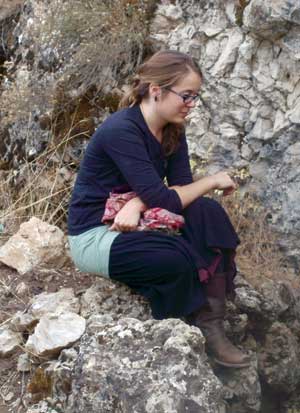
“Si,” I replied to the store clerk ringing up my purchases. “Muchas gracias. Oh, I mean, yes, thank you!” I quickly corrected myself, feeling embarrassed. “I’m sorry; I just got back from Spain,” I explained to the clerk. My mother, standing nearby, laughed at me lovingly. “Welcome home, Rachel,” she teased. I just sighed and smiled.
 It was the end of 2009, and I had recently returned from hiking the Camino de Santiago in Spain. After spending five weeks speaking mostly Spanish, my transition back to semi-suburban life in Baltimore, Maryland, felt rough. I had lived out of my backpack for that time, and now I had to figure out how to get the rest of my belongings from my parents’ house to Richmond, Indiana, to attend seminary at Earlham School of Religion. What I really wanted to do is throw everything away and just head out west. My mom wisely advised me to wait and see how I felt in a few weeks—once I had finished returning home.
It was the end of 2009, and I had recently returned from hiking the Camino de Santiago in Spain. After spending five weeks speaking mostly Spanish, my transition back to semi-suburban life in Baltimore, Maryland, felt rough. I had lived out of my backpack for that time, and now I had to figure out how to get the rest of my belongings from my parents’ house to Richmond, Indiana, to attend seminary at Earlham School of Religion. What I really wanted to do is throw everything away and just head out west. My mom wisely advised me to wait and see how I felt in a few weeks—once I had finished returning home.
One of the most formative experiences that an individual has in life is the experience of “the return,” whether that return is as common as coming home after a first day at school or as foreign as coming home after long travel abroad. We have a new and different experience, whatever it might be, and then we integrate that experience into daily life. This integration is part of how we grow and flourish in the world. The return is an archetypal experience that has been recorded in myths and stories through the centuries, often portrayed as a simple event but one with much potential for discovering how the experience has changed the one who returns.
When I was in high school, I attended the High School Young Friends Conferences of Baltimore Yearly Meeting. Experiencing moderate alienation and othering in my public high school, I viewed these weekend conferences as places of unconditional love and acceptance. From the moment my parents dropped me off on Friday night to when they picked me up on Sunday after worship, I felt elated in the presence of peers who loved me, believed in me, wanted me around, and cared for my whole person. By the end of the conference, I was usually exhausted, having barely slept so as to maximize my time with these caring and accepting people.
The following Monday morning, I would drag myself out of bed and go to school. Each time (every other month for four years) upon coming home from school on Monday evening, I would break into tears in front of my parents, and declare the cruelty of my high school peers, the injustice of having to hide who I was, and my deep grief over missing that unconditionally loving peer environment until the next conference. My parents called it Post Conference Syndrome, and they weathered each breakdown for several days until I was able to integrate my experiences from Young Friends into my daily life and hang on until the next conference.
This Post Conference Syndrome has inflicted me again and again over the years. Whether it is the depression that follows attending a Friends General Conference Gathering, a session at Quaker camp, or a multi-day backpacking trip, or the reverse culture shock of coming home from a second or third world country and fiercely analyzing personal privilege, my experience with returning has been essential to the development of my sense of self.
When I was in seminary, I researched a field of study called narrative theology. I focused much of my studies on the developmental works of James W. Fowler, Erik Erikson, and Lawrence Kohlberg. Each of these psychologists developed his own theory of how individuals grow in understanding of the self as well as self within a community. The three development progression theories each include a point at which the self is understood in relation to others. I also found in my research that this one point along the progression of human development—this understanding of the self in relation to others—is a point that people revisit over and over again throughout their lives.
Concurrently I studied one of Joseph Campbell’s literary analysis methods called “the hero’s journey,” which Campbell used to analyze ancient myths, stories, and fables. In Campbell’s analysis, the hero or central character in the story always comes full circle in the journey. The hero always returns home after a life-changing experience and struggles to integrate a new sense of self into the unchanged reality of home. I like to think that we are the heroes in our own true stories, and throughout our lives we cycle through new experiences and returns. Whenever we have left behind the everyday life and have experienced something new, we then return and work to integrate the new with what has remained at home.
My parents gave me many opportunities over the years to return home. I recognize my privilege in being able to go to Quaker camp, attend college, and travel abroad, although these experiences are not unusual in our American culture, which is devoid of formal coming-of-age rituals. It is common for teenagers and young adults in the United States to seek out experiences beyond the realm of what is considered home—to leave and then return.
And with those returns comes the hard task of integration: reimagining one’s daily life considering all that has been learned. When I came home from my first trip abroad (which I traveled solo), I gave away more than half of my personal possessions. I had met some young adult Friends in Europe who dressed plain and lived simply. My experiences with them challenged my own ideas about Quaker simplicity. I did the same thing again when I came home from Kenya in 2005 and from Rwanda in 2006. Traveling through the second and third worlds, witnessing poverty and hunger, and being exposed to the intense faith of my Quaker friends made me question my privileges. I considered living out of my car for my last year of college. I questioned finishing college altogether. At times, in those periods immediately after my travels, I grew depressed not knowing the purpose of what I was doing in the world.
Yet it has been in my travels, now to over 23 different countries, that I have most intimately experienced God. God has sat next to me on various planes, waiting patiently for me to stop worrying over my life; to grow bored by the waiting; and to turn my thoughts, my heart, my soul to God’s presence and listen. God has walked with me over the hills of many countrysides, comforting me when I was lost in an unfamiliar land and providing solace in times of grave loneliness. God has been present with me through people I have met, moments of great beauty I have witnessed, and unexpected joys that I have felt along the way.
And when I come to the return, when I struggle to make meaning of what I have experienced and weave it into my daily life, when I grow depressed or angry at the injustice of my privileges, or when I feel a deep sense of grief in missing friends from far away, it has been God who has cried with me, yelled with me, and listened to my confusion.
Often God works through members of my Quaker community, individuals who have been that listening ear, that shoulder to cry on, that heart to share in listening deeply. These members in my community have played an important role in my returns, asking me the deepest penetrating questions and recognizing the changes in me from my time away.
My Quaker friends from over the years have also been witnesses to my journey. In 2011, I participated in a delegation of Christian Peacemaker Teams to Kurdistan and Iraq. Before I left I collected inspiration from my Quaker friends in the form of poems, prayers, songs, pictures, and other snapshots; with these items I made a prayer scrapbook to take with me. A few nights before my flight, my friends held worship to support me in my ministry. The vocal ministry given that night was added to the book. Once I was abroad, I found the wisdom and grace in that book to organize worship each day for the delegation. In this way, I brought my community along with me, and when I returned, my friends were eager to hear the stories of where they had been.
Six years ago I walked the Camino de Santiago, translated as “the Way of St. James,” a pilgrimage trail over 500 miles long in the northern part of Spain. It was a profound experience of God’s presence as I walked in the footsteps of millions of other pilgrims who had traveled that same path over the centuries. I met a friend along the way who had finished the Camino earlier that year. He told me there were two things that he missed most about being a pilgrim. One was getting up each day and only having to follow the yellow arrows: a simple direction, laid out, clear for him to follow. The second thing was the kind encouragement he’d received. He said he missed how everyone, absolutely everyone, he met wished him a buen camino, a “good journey.” “Rachel, you know the Camino doesn’t end once you get to Santiago,” he instructed. “No, that’s when it begins. When you’re done here, that’s when your pilgrimage really begins. The signposts aren’t so obvious and the voices of people wishing you a good journey aren’t so loud, but they are there. You just have to look harder.”
My friend’s advice has stayed with me over the years. I’ve shared it with many other pilgrims, and we all find truth in its wisdom. Returning home doesn’t mean leaving the journey behind, and it can’t mean being who you were before you left. Returning home is a journey in and of itself, and I have found that my Quaker community has been integral in accompanying me in those journeys home. This return is a process of becoming: it’s a part of being a life pilgrim; and with any pilgrimage, there are people who you meet along the way.









I can resonate well with this article by Rachel. After returning home from 4 years at college, my father said to me, “You’ve changed. College has changed you.”, meaning that my opinions and feelings about all sorts of things were far different than they were when I first left for college. And the world around me had changed as well. But what gave me purpose for the rest of my life was that, with the help of my wife, I used those changes (those transformations that Quakers have talked about for ages) as Leadings for all types of meaningful activities and my life’s professional work.
Thank you for holding up one of the most important aspects of pilgrimage, integration, and for sharing your friend’s wisdom about the journey truly beginning only when it is over. I will definitely share that with the women traveling with me to France on the Mary Magdalene pilgrimage this year. Best wishes to you on your next journey in Italy. Love always, Maggie